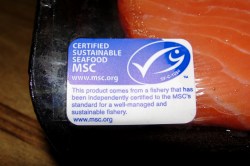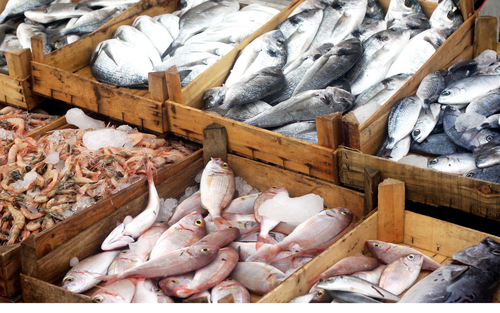
DeckhandHere’s the Marine Stewardship Council label, FWIW.
Never mind knowing what kind of fish you’re eating — even when you do know, you still probably don’t have all the deets on just how green it is.
Nearly 90 percent of the world’s fisheries are either overexploited or almost overexploited. At some point this year, we’ll eat more farmed fish than wild fish worldwide, a milestone for fish farms and a scary prospect for the food system and eviscerated oceans.
In a recent poll commissioned by NPR, nearly 80 percent of respondents said it’s important or very important to them that the seafood they buy is sustainably caught. But how can they really know? There are dozens of different sustainable seafood guides, advisory lists, labels, and certifications.
When McDonald’s recently switched to fish products approved by the Marine Stewardship Council (MSC), it celebrated the change with packaging proclaiming sustainability. But the Alaskan pollock McDonald’s is serving isn’t considered a best choice by all fish-watch groups, and some environmentalists say the whole MSC rating system isn’t all it’s cracked up to be. From NPR’s three-part series on the topic:
“We’re not getting what we think we’re getting,” says Susanna Fuller, co-director of marine programs at Canada’s Ecology Action Centre. She says the consumer, when purchasing seafood with the blue MSC label, is “not buying something that’s sustainable now.”
If the label were accurate, Fuller says, it would include what she says is troubling fine print: The MSC system has certified most fisheries with “conditions.” Those conditions spell out that the fishermen will have to change the way they operate or study how their methods are affecting the environment — or both. But they have years to comply with those conditions after the fisheries have already been certified sustainable.
The MSC seems to expect the best of everyone. For example, the organization won’t flat-out condemn dredging, “a method of dragging giant rakes across the ocean floor,” as NPR describes it. Even though many dredging operations rip up sea ecosystems, MSC argues that some boats dredge carefully.
Since it was founded in 1997, the MSC has become the most influential organization in the world that tells consumers which seafood is supposed to be good or bad for the environment. Today, MSC-certified fisheries account for roughly 8 percent of the world’s seafood catch, worth more than $3 billion, according to the MSC website.
[MSC CEO Rupert] Howes and the MSC’s supporters say the organization has helped push fishing companies to use better, more ecologically sound methods. Many environmentalists and scientists agree that the MSC has made progress, but they say it’s deceiving consumers into thinking that the choices they make at the market have a bigger impact than they really do.
Here’s the kicker: Walmart’s seafood buyer is concerned about problems with the MSC’s ratings system while the Whole Foods buyer is all, “Whatevs.” This makes me feel a lot of feelings, and none of them are very good.
If you like journalism that gives you a stomachache too (I mean, you’re reading this, right?), check out the final part of NPR’s series on sustainable fish this evening on All Things Considered.



